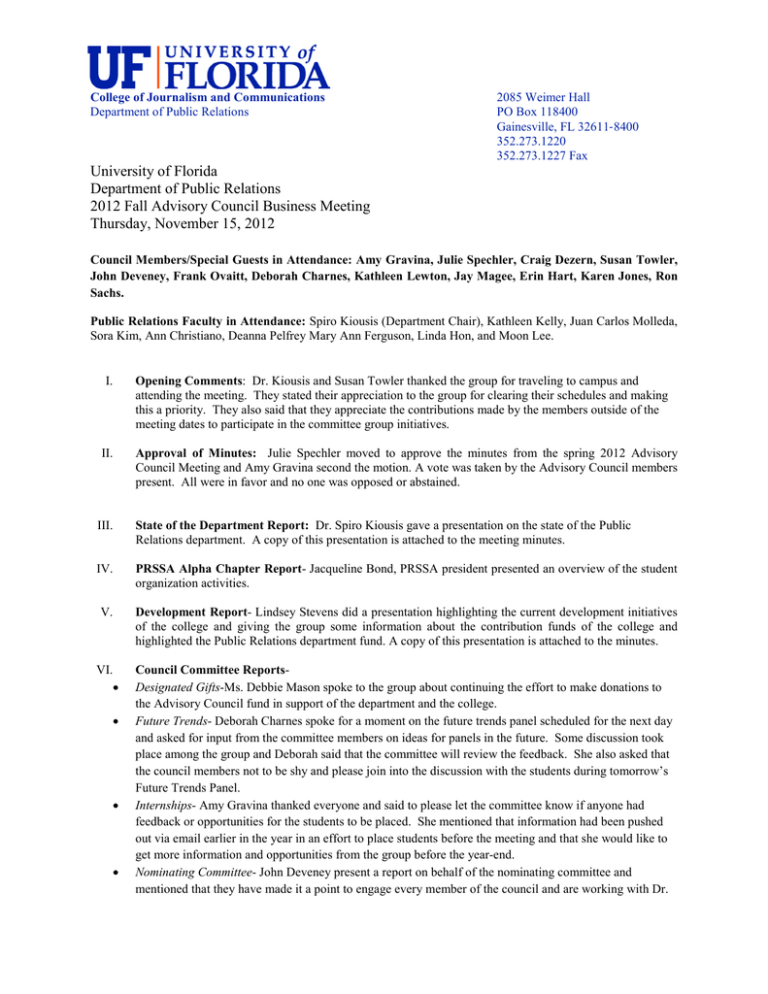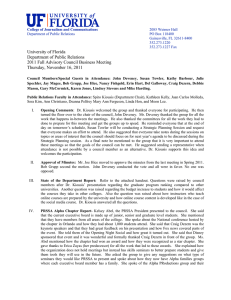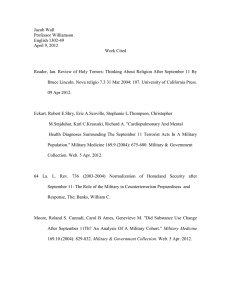College of Journalism and Communications 2085 Weimer Hall Department of Public Relations
advertisement

College of Journalism and Communications Department of Public Relations 2085 Weimer Hall PO Box 118400 Gainesville, FL 32611‐8400 352.273.1220 352.273.1227 Fax University of Florida Department of Public Relations 2012 Fall Advisory Council Business Meeting Thursday, November 15, 2012 Council Members/Special Guests in Attendance: Amy Gravina, Julie Spechler, Craig Dezern, Susan Towler, John Deveney, Frank Ovaitt, Deborah Charnes, Kathleen Lewton, Jay Magee, Erin Hart, Karen Jones, Ron Sachs. Public Relations Faculty in Attendance: Spiro Kiousis (Department Chair), Kathleen Kelly, Juan Carlos Molleda, Sora Kim, Ann Christiano, Deanna Pelfrey Mary Ann Ferguson, Linda Hon, and Moon Lee. I. Opening Comments: Dr. Kiousis and Susan Towler thanked the group for traveling to campus and attending the meeting. They stated their appreciation to the group for clearing their schedules and making this a priority. They also said that they appreciate the contributions made by the members outside of the meeting dates to participate in the committee group initiatives. II. Approval of Minutes: Julie Spechler moved to approve the minutes from the spring 2012 Advisory Council Meeting and Amy Gravina second the motion. A vote was taken by the Advisory Council members present. All were in favor and no one was opposed or abstained. III. State of the Department Report: Dr. Spiro Kiousis gave a presentation on the state of the Public Relations department. A copy of this presentation is attached to the meeting minutes. IV. PRSSA Alpha Chapter Report- Jacqueline Bond, PRSSA president presented an overview of the student organization activities. V. Development Report- Lindsey Stevens did a presentation highlighting the current development initiatives of the college and giving the group some information about the contribution funds of the college and highlighted the Public Relations department fund. A copy of this presentation is attached to the minutes. VI. • • • • Council Committee ReportsDesignated Gifts-Ms. Debbie Mason spoke to the group about continuing the effort to make donations to the Advisory Council fund in support of the department and the college. Future Trends- Deborah Charnes spoke for a moment on the future trends panel scheduled for the next day and asked for input from the committee members on ideas for panels in the future. Some discussion took place among the group and Deborah said that the committee will review the feedback. She also asked that the council members not to be shy and please join into the discussion with the students during tomorrow’s Future Trends Panel. Internships- Amy Gravina thanked everyone and said to please let the committee know if anyone had feedback or opportunities for the students to be placed. She mentioned that information had been pushed out via email earlier in the year in an effort to place students before the meeting and that she would like to get more information and opportunities from the group before the year-end. Nominating Committee- John Deveney present a report on behalf of the nominating committee and mentioned that they have made it a point to engage every member of the council and are working with Dr. • • • VII. VIII. Kiousis to make sure that everyone is appointed to a committee. This will help the efforts of the group and everyone should be engaged on committee initiatives in between meetings. He said that they have submitted a list of names to Dr. Kiousis with suggestions for members who could be of use for next year. Communications Committee-Susan Towler and Dr. Kiousis presented a hand out of Jay Magee’s report regarding the activities of the Communication committee. Bateman Committee- Deanna Pelfrey and Craig Dezern presented a report of what the current Bateman Team is working on and spoke about the research they have been doing in preparation for the competition. Deanna Pelfrey mentioned that next semester the students would be taking a campaigns class and then she introduced each member of the team. She also mentioned that the topic for the competition is Bullying and asked any member who had information or ideas about this topic to please communicate with her. Department Research Support- Dr. Kiousis presented a brief report on what the committee is currently working on and thanked Bob Grupp and Dr. Moon Lee for their work on collecting and reviewing the research proposals submitted. From the call of research topics he explained that two students were chosen, who are currently doing their research and they were asked to present to the group. The students chosen were Fang Zhang and Jieun Chung. They each did a brief presentation on their topic and distributed a short summary of their research topic which is attached to these minutes. Dates for spring 2013 Meeting- Dr. Kiousis announced that the proposed dates for the next meeting are March 28th & 29th. He said that there would be some discussion between the council chair and himself to finalize the date and that he would send out an email in the near future with the decision. Other Business- Dr. Kiousis presented John Deveney with a gift for his service on the council as an outgoing member and also presented Susan Towler with a plaque for her service as chair of the group. The members then went around the room and highlighted any special news they wanted to share with the group. Meeting was adjourned at 6:05pm. Submitted by Martha R. Collada Public Relations Office Assistant Public Relations Advisory Council AGENDA I. Opening Comments Susan Towler, APR Council Chair II. Approval of Minutes All III. State of the Department Report Spiro Kiousis, Ph.D., APR, Department Chair Business Meeting Thursday November 15, 2012 4:00 p.m. – 6:00 p.m. IV. PRSSA Alpha Chapter Report Jacqueline Bond, PRSSA President V. Development Report & Recognition Lindsey Stevens VI. Council Committee Reports • Designated Gifts Debbie Mason, APR, Fellow PRSA • Future Trends Deborah Charnes and Karen Jones • Internships Amy Gravina, APR • Nominating Committee John Deveney, ABC, APR, Fellow PRSA • Communications Committee Jay Magee, APR • Bateman Committee Craig Dezern & Deanna Pelfrey, APR, Fellow PRSA • Department Research Support Bob Grupp, APR & Moon Lee, Ph.D. VII. Dates for Spring 2013 Meeting VIII. Other Business All IX. Networking State of the Department of Public Relations Report* Spiro Kiousis, Ph.D., APR Professor and Chair * Adapted from multiple sources Advisory Council Membership • Thank you for your service – – – – – Grace Leong, APR Mike Cherenson, APR, Fellow PRSA Tony D’Angelo, APR, Fellow PRSA Charles Nicolas John Deveney, ABC, APR, Fellow PRSA – Necole Merritt Personnel • Current Department Makeup – 9 full-time faculty – 5 full professors – 2 associate professors – 1 assistant professors – 1 lecturer • Dr. Juan-Carlos Molleda named director of Global Strategic Communication program. • Dr. Linda Hon named Director for the Public Relations, Digital Communications, and Social Advocacy Project within the Digital Communications Research Consortium of the Center for Media Innovation + Research. • Dean John Wright stepping down after Fall 2012. • Dean Diane McFarlin to begin Spring 2013 Some Priorities • • • • • • • • • • Aha! Innovation CoLab Public Interest Communication Distance/Online education University Budgeting System (RCM) Faculty Size and Compensation Enrollment Management Resources for Faculty Development Graduate Student Funding Curriculum Update UF Presidential Search Distance/Online Education • • Goals Undergraduate Efforts – – – – – – – – – – ADV 4400 International Advertising JOU 3346L Multimedia Reporting JOU 4308 Magazine and Feature Writing JOU 4930 Specialized Features PUR 4932 Social Media Management RTV 3280 Interactive Media RTV 3411 Race/Gender/Class and Media RTV 4283 Advanced Interactive Reporting RTV 4930 Social Media Ethics RTV 4930 Social Media Management Distance Education • Graduate programs – Web Design and Online Communication Program – Global Strategic Communication Program – Social Media Program (Summer 2013) • How you can assist – Recruit students – Identify instructors – Share ideas for courses and programs Faculty/Graduate Student Research 2011-2012 • Public Relations faculty and graduate students presented several paper to AEJMC, ICA, and PRSA conferences. • Dr. Juan-Carlos Molleda, doctoral student Sarab Kochhar, and coauthor from Spain receive top paper award at PRSA International Conference in San Francisco • Dr. Linda Hon named to the PR News Measurement Hall of Fame. Quality and Impact of Scholarship • Sample journals – – – – – – – Journal of Public Relations Research Public Relations Review Journalism and Mass Communication Quarterly Mass Communication and Society Journal of Communication Management International Communication Gazette Journal of Communication • College doctoral program ranks 6th in recent assessment. • The Communication Institute for Online Scholarship’s ComVista service rates Department’s research publication productivity in Top 10 for six research specializations. Teaching • Enrollments – Fall 2012=422 juniors/seniors (571 total) • Diversity – 39% minority enrollment – 87% female enrollment • Faculty Student Ratios – Overall 76:1 – Upper Division 56:1 Teaching • Graduate Enrollments – 47 Master’s Students – 13 Ph.D. Students – College and University priority on graduate enrollments • Internships – A total of 179 internships completed last year. Of those, only 18 were paid. Teaching Accomplishments • Spring 2012 Instructor Evaluations – Instructor Evaluations • Department Average=4.10 • College Average=4.29 – Instructor Overall • Department Average=4.11 • College Average=4.30 • Study Abroad program offered in Spain and Greece coordinated by Professor Ann Christiano. Sample Student Accomplishments • • 2012 Bateman Team wins Second Place and is finalist for second year in a row! 2013 Bateman Competition Team • Faculty Adviser – Deanna Pelfrey, APR, Fellow PRSA • Professional Adviser – Craig Dezern, Vice President, Global Public Relations, Walt Disney Parks and Resorts • Advisory Council Committee Head – Craig Dezern, Vice President, Global Public Relations, Walt Disney Parks and Resorts Service Activities • Dr. Linda Hon continues service on Board of Directors, Plank Center for Public Relations Leadership, University of Alabama, Tuscaloosa. • Dr. Kathleen Kelly, APR, Fellow PRSA continues service in Arthur Page Society and Institute for Public Relations Board. • Dr. Juan-Carlos Molleda is serving as Chair of Public Relations Division in International Communication Association. • Professor Deanna Pelfrey, APR, Fellow PRSA is chairing UF Welfare Council and is serving as a member of the UF Steering Committee. Development • • PR Advisory Council Fund – Support for conference memberships and faculty travel to AEJMC, ICA, and PRSA. Faculty receiving support include Dr. Juan-Carlos, Molleda, Dr. Kathleen Kelly, APR, Fellow PRSA, Dr. Sora Kim, Dr. Moon Lee, and Professor Deanna Pelfrey, APR, Fellow PRSA. – Support for graduate student research. – Wells Fargo Gift for $15,000 (Thank you Oscar!) – Al and Nancy Burnett Charitable Fund $20,000 (Thank you Amy!) – Thank you all! Frank Karel Chair of Public Interest Communications – Thank you Frank and Betsy! Curriculum Revision • Recent Highlights – Increased total credit hours to 52 – Increase internship credit hours to 6 – International Public Relations becomes required course – Students will be offered a certificate in international communication – Seeking approval for certificate in public interest communication – More electives across College Thank you and questions DEVELOPMENT & ALUMNI AFFAIRS College of Journalism & Communications News Florida Tomorrow Campaigned closed October 5th with a total of $1.7 Billion Raised College raised $20,612,877 New Senior Development Officer Fall Board Tailgate 2013 Public Relations Advisory Council Fund Fund number: F014191 Use of Funds: Support faculty and student development within the Public Relations Department Total contributions since 2008 inception: $49,925 Total number: 49 Average contribution: $1018.88 Personal contributions: 65% Company/foundation contributions: 35% College general contribution funds Funds include general Journalism Fund, Dean’s Leadership Council, and Journalism Annual Fund accounts Average contribution: $513.40 Individual contribution: 96% Company contribution: 4% Comparison Summary Fund Average % Individual % Company PR Advisory Council $1018.88 65% 35% 513.40 96% 4% General Journalism College Funds Advisory board development committee Purpose: Primary capital project is AHA! The Innovation CoLab Grow the PR Advisory Fund, which supports faculty growth and support Goal: Be top department in college for alumni participation in annual giving. Advisory board development committee Target projects: • Annual target at least $750 per year per member • Engage former council members • Engage new donor prospects Questions? Thank You! University of Florida Public Relations Advisory Council – Fall 2012 Communications Committee Report Committee Chair: Members: Grace Leong, APR Tony D’Angelo, APR, Fellow PRSA; Mike Cherenson, APR; Jay Magee, APR (with ongoing and generous support from Nancy Fishgold) Advisory Council Website Grace, Jay and Nancy have discussed a sunset of the website (ufprac.org), which would be replaced with a Facebook page that would retain many of the site’s assets and be managed through an editorial calendar driven by committee members and perhaps with support from PRSSA students. The premise is that it will be easier to create meaningful conversations and dialogue if we go where students, faculty and members already are, vs. drawing people to a (largely) static website. Before anything is done we will attempt to collect analytics on the existing site and capture key assets. Further discussions will follow the fall meeting. Twitter List Although the Council doesn’t have its own Twitter account at this time, we have created a Twitter list of Council members (based on Twitter IDs provided at the spring meeting). Subscribe at https://twitter.com/jaymagee/ufprac and let Jay know if you’d like to be added to or removed from this list. Faculty and Student Survey The results of the Council member and student surveys, which wrapped up in the spring, will be unearthed and reported to the Council in the post-meeting fall e-news. As a reminder (especially if you haven’t done it yet … you still have until Friday), the link to the Council member survey is: http://www.surveymonkey.com/s/CB5G59B. Council Publicity Grace has presented the idea of the committee taking a more active role in promoting Council business (and to some extent, news from the College in coordination with Quenta) in trade books such as PR Week. How else might we promote the work our Council undertakes, and through which channels? We are open to and respectful of Council members’ feedback as we endeavor to increase visibility for the great work we do. Please share with Grace or Jay. Connecting Council Members with Students Another ongoing focus area for the committee will be to investigate meaningful, purposeful and sustainable ways to connect Council members with students or otherwise better serve them. Video chats, virtual speaking engagements with PRSSA and online mentorships are just a few ideas. We welcome your additional thoughts – especially ones in which you can help. Please share with Grace or Jay. New Committee Chair With Grace’s Council term expiring this month, Spiro has asked Jay Magee to accept the role of incoming Chair, and he has accepted. Jay will touch base with other committee members to gauge their continued interest in the committee beyond the fall meeting. Respectfully submitted, Jay Magee, APR (for Grace Leong, APR) November 14, 2012 Name: Fang Zhang UFID: 38197194 How Governments Utilize Social Media in Disaster Management? Hurricane Sandy, which was the largest Atlantic hurricane on record, attacked portions of the Caribbean, Mid-Atlantic and Northeastern United States in later October 2012, bringing tremendous damages to a couple of countries. The report by the Intergovernmental Panel on Climate Change emphasized that it is necessary for all nations to act now because increasing numbers of natural disasters have threatened human lives and properties worldwide. Therefore, managing disasters is of great urgent to all nations all over the world. At the same time, the publics also have high expectations toward governments’ disaster management ability, whereas governments’ disaster prevention ability, supervision, rescuing speed and allocation of suppliers were always criticized by publics. Therefore, it is essential for governments to look for solutions to handle crises. Media control is one of the most important skills in natural disaster management. During the disaster preparedness phase, controlling media is crucial to a company or a government’s information accuracy and public image establishment. With the Internet, especially social media, governments need to recognize that traditional media no longer dominates information sharing and communications. It is critical to make sure social media are providing the information needed by people affected by emergencies and disaster with an effective channel. In this point, professional public relation practitioners play significant roles in assisting governments in utilizing social media during disaster management, discoursing accurate information, building positive public images, and so on. This research will use Coomb’s situational crisis management model and Heider’s attribution theory in answering the following questions: 1. If publics attribute the responsibility of a disaster to the U.S. government (internal), how will the Name: Fang Zhang UFID: 38197194 U.S. government use proper strategies to handle it? 2. How do social media play a role in mediating publics’ attribution? 3. How do social media play a role in disaster management’s 4 phases, including mitigation, preparedness response and recovery? 4. Eventually, this study aims to get some strategies which are suitable in different disasters’ situations for the U.S governments. In regard of research method, I will focus on using a self-managed survey. As questionnaires are most directly related to and primarily used in survey research, I will design a questionnaire. In order to complete this study successfully, I believe useful data and enough financial support are irreplaceable. With useful data, I will elaborate my paper, providing detailed literature and recent data. With enough financial support, I can find more people to help me to manage the survey and have more people participate in my study. Therefore, I hope advisory council members could consider my research. Thank you for your time! THE IMPACT OF THE HEALTH CAMPAIGN MESSAGE AND MEDIA ON HPV VACCINE INTENTION AMONG MEN AND WOMEN By JIEUN CHUNG Human Papillomavirus (HPV) is the most common sexually transmitted infection (Hoover, 2000), and more than 50% of sexually active men and women get it at some point in their lives (Centers for Disease Control and Prevention [CDC], 2012). In the United States, approximately 20 million Americans are currently infected with HPV, and an additional 6 million Americans become newly infected each year (CDC, 2012). HPV causes cervical cancer in women, genital warts in men, and other cancers in both men and women. Given the many HPV-related health problems, preventing HPV is critical for both men and women and an effective HPV vaccine campaign is important for preventing HPV in both women and men. To ensure the success of the health campaign, using appropriate media channels is critical. The emergence of the Web 2.0 and social network sites as an effective outlet has greatly influenced people looking for health information and seeking to engage in healthy behaviors (CDC, 2011). Although people are aware of the importance of social networking sites, there are few studies about the effect of health campaign. Therefore, this study investigates the effects of social networking site when health campaign is conducted. Message framing is important for maximizing the success of the health campaign as people respond differently to messages according to how these messages are framed (Kahneman & Tversky, 1979, 1982). Message framing has been applied to various health studies. Many studies have demonstrated that gain-framed messages are more effective for prevention behavior, such as exercise behavior, sunscreen use to prevent skin cancer, and vaccinations (Detweiler, Bedell, Salovey, Pronin, & Rothman, 1999; Jones, Sinclair, & Courneya, 2003; Millar & Millar, 2000; McCaul, John, & Rothman, 2002). Yet despite the numerous studies about prevention behavior in healthcare settings, few studies have examined such behavior in relation to the HPV vaccine. Health belief model (HBM) is also a useful framework for investigating vaccination behaviors, such as HPV vaccine (Reiter et al., 2009) and initial goal of HBM is that understanding why most people do not participate in programs to prevent illness via checkups (Rosenstock, 1966). HBM is often used when a health professional develops a health education program to promote a health campaign (Witte et al., 2001). The HBM indicates that people’s proactive health behavior such as vaccination behavior is influenced by perceived susceptibility, perceived severity, perceived benefits, perceived barriers (Janz & Becker, 1984) and selfefficacy (Rosenstock, Strecher, & Becker, 1988). Based on the HBM, this study investigates how gain and loss framed message affect on the HBM factors and how these factors affect on the public’s behavior intention. Therefore, this study aims to a) discover how the health campaign messages (gain-frame message/loss-frame message) affect university students’ perceptions of HBM factors; b) examine how these perceptions of HBM factors influence females’ and males’ intentions to vaccinate themselves; c) examine which media (social network sites/traditional media) more readily influence university females’ and males’ perceptions of HBM factors and behavior intentions. To this end, this study will include an experiment with a 2 (message framing: gain-frame message/loss-frame message) x 2 (media types: social network sites/traditional media) factorial design. By investigating the effect of HPV vaccine campaign messages and media channels, the present study will expand the literature on interactive social network sites in the context of health settings in order to understand how public relations professionals can effectively utilize social network sites in health communication campaign to enhance the public’s health.




